| wood s lot july 1, 2008 | ||
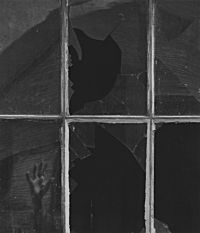 Aaron Siskind |
July 15, 2008
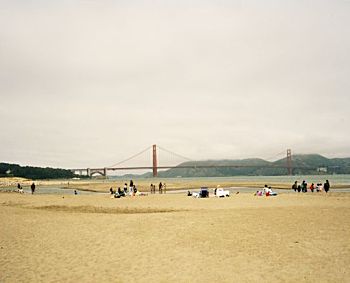 via Shane Lavalette
Jack Spicer at Penn Sound and the Electronic Poetry CenterPsychoanalysis: An Elegy
Jack Spicer Feature
Experience is the outcome of work; immediate experience is the phantasmagoria of the idler. 
Walter Benjamin
The wrinkles and creases on our faces are the registration of the great passions, vices, insights that called upon us... but we, the masters, were not home.
The Author as Producer What is the relationship bewtween form and content, particularly in political poetry? This kind of question has a bad name; rightly so. It is the textbook exambple of the attempt to explain literary connections undialectically, with clichés....A Small History of Photography Walter Benjamin 1931 The camera is getting smaller and smaller, ever readier to capture fleeting and secret moments whose images paralyse the associative mechanisms in the beholder. This is where the caption comes in, whereby photography turns all life's relationships into literature,and without which all contructivist photography must remain arrested in the approximate. Not for nothing have Atget's photographs been likened to those of the scene of a crime. But is not everfy square inch of our cities the scene of a crime? Every passer-by a culprit? Is it not the task of the photograopher - descendant of the augurs and haruspices - to reveal guilt and to point out the guilty in his pictures? "The illiteracy of the future", someone* has said, "will be ignorance not of reading or writing, but of photography." But must not a photographer who cannot read his own pictures be no less accounted an illiterate? Will not the caption become the most important part of the photograph? Such are the questions in which the interval of ninety years that separate us from the age of the edaguerrotype discharges its historical tension.* the "someone" was László Moholy-Nagy according to this footnote: (5.) The famous phrase, "The illiterate of the future will be ignorant of the pen and the camera alike" is Moholy's. It has gained its considerable currency mainly by way of its paraphrasing --without attribution -- in Walter Benjamin's celebrated "Kunswerk" essay of 1936. Moholy's observation, originally in English, was written in 1932 and first published in "A New Instrument of Vision," Telehor (Brno) I, 1-2, Feb. 28 1936, 34-365 (Reprinted Kostelanetz, ed., Moholy-Nagy, [London: Allen Lane the Penguin Press, 1970], p. 54).in In Focus: Laszlo Moholy-Nagy Nancy Roth Afterimage, July-August, 1997 thanks to Helquin Artifacts
"Imagine Lucifer..." Jack Spicer Imagine Lucifer An angel without angelness An apple Plucked clear by will of taste, color, Strength, beauty, roundness, seed Absent of all God painted, present everything An apple is. Imagine Lucifer An angel without angelness A poem That has revised itself out of sound Imagine, rhyme, concordance Absent of all God spoke of, present everything A poem is. The law I say, the Law Is? What is Lucifer An emperor with no clothes No skin, no flesh, no heart An emperor!
Melancholia, Mourning And The Task Of The Translator
The Storyteller [PDF] the storyteller is a man who has counsel for his readers. But if today "having counsel" is beginning to have an old-fashioned ring, this is because the communicability of experience is decreasing. In consequence we have no counsel either for ourselves or for others. After all, counsel is less an answer to a question than a proposal concerning the continuation of a story which is just unfolding. To seek this counsel one would first have to be able to tell the story. (Quite apart from the fact that a man is receptive to counsel only to the extent that he allows his situation to speak.) Counsel woven into the fabric of real life is wisdom. The art of storytelling is reaching its end because the epic side of truth, wisdom, is dying out. This, however, is a process that has been going on for a long time. And nothing would be more fatuous than to want to see in it merely a "symptom of decay," let alone a "modern" symptom. It is, rather, only a concomitant symptom of the secular productive forces of history, a concomitant that has quite gradually removed narrative from the realm of living speech and at the same time is making it possible to see a new beauty in what is vanishing.The Work of Art in the Age of Mechanical Reproduction Walter Benjamin (1936) 1940 Survey Of French Literature
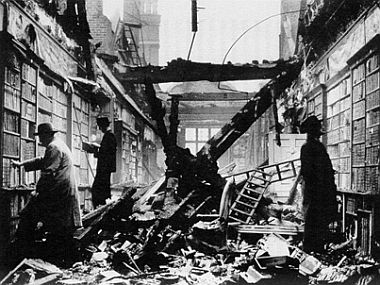
Reading in the Ruins
Surreal Dreamscapes: Walter Benjamin and the Arcades [PDF] AbstractThe Passageways of Paris: Walter Benjamin's Arcades Project and Contemporary Cultural Debate in the West Christopher Rollason
Remains To Be Seen So it was for this that Walter Benjamin summoned voices to blend and to contend with his, and with each other's, ones that he found to flow along his dreams (e.g., p. 467)--his and (he claims, as a philosopher must) ours (e.g., pp. 212, 391)--from which the work of this work is variously to join in awakening us (e.g., pp. 388, 458), rescuing (e.g., pp. 473, 476) or say redeeming (e.g., pp. 332, 462) the phenomena of our world, processes that require blasting phenomena from their historical successions (p. 475), suggesting thought as a volcano (p. 698), forming new constellations (e.g., p. 463), allegorizing (e.g., pp. 211, 330, 367) the dialectical in every genuine image (e.g., 462, 473), where the place one encounters such an image is language (p. 462), in which the past and future are polarized by means of anticipating as it were the present (p. 470) (a thought Benjamin compliments Turgot for formulating [p. 478]; for us it is quite pure Thoreau), and where, further, "the present" is not a fixed point but a scene of ruins (p. 474), illuminated by flashes of lightning (e.g., pp. 91, 226, 456) (a melodramatic but recognizable vision of Wittgenstein's Investigations), each of which marks a now, a dawn, of recognition (e.g., pp. 463, 473), allowing thought to be drawn, as by the magnetic North Pole (p. 456) (which others correct for, which Benjamin claims to correct by), not toward purported permanencies and their petrified (p. 366) understandings (supporting our familiar forms of social cohesion) but to the debris or detritus of a culture (pp. 460, 543), occasions for reading, for rebuking the idea of decline as much as the idea of progress in history (e.g., 460).
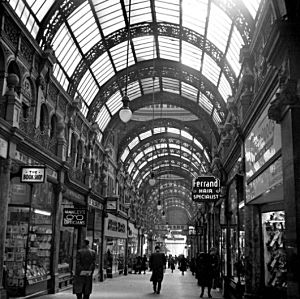
The County Arcade, Leeds
Why all the interest in a treatise on shopping in 19th century France? There is no doubt that to rationalise and design Benjamin in preparation for his comfortable digestion by capital's cultural machine is a piece of twisted prostitution of the kind he would fully have appreciated. A recovery of the sense of Benjamin's writing is the surest path to its radical impoverishment. The object of philosophy, insofar as the reflective meditation upon thought could be taken to characterize it, is arbitrarily prescribed as undisturbed reasoning. It is thus that successfully adapted, tranquil, moderate and productive reason monopolizes the philosophical conception of thought, in the same way that the generalized somnambulism of regulated labour precludes all intense gestures from social existence. Who cares what "anyone" thinks, knows, or theorizes about Benjamin? The only thing to try and touch is the intense shock wave that still reaches us along with the textual embers, for as long, that is, as anything can still "reach us." Where Descartes needed God to mediate his relations with his contemporaries, secular humanity is content with the TV-screen, and with all the other commodified channels of simulated communication with which civilization is so thoughtfully endowed. Such things are for our own protection of course; to filter out the terrifying threat of a realisation that would awaken us from our dream.
Metaphysics of the Profane
Walter Benjamin and the Virtual: Politics, Art, and Mediation in the Age of Global Culture “Politicizing Art”: Benjamin’s Redemptive Critique of Technology in the Age of Fascism Walter Benjamin Research Syndicate
History is photography: the afterimage of Walter Benjamin
from Walter Benjamin's understanding of memory is bound up with his philosophy of language and history and his theology, but it is based on an experience he characterizes as the "chaos of memories." There is a resistance to narrative ordering and control associated with memory for Benjamin. He specifies this resistance further: "I find in my memory rigidly fixed words, expressions, verses that, like a malleable mass which has later cooled and hardened, preserve in me the imprint of the collision between a larger collective and myself" in which "isolated words have remained in place as marks of catastrophic encounters." Catastrophe engenders memories whose rough and hardened edges preclude placement in smooth-flowing narratives as a form of coming to terms with the past. These memories are disturbing in a manner similar to dreams. Like dreams, these memories involve crossing a threshold and stepping outside the closed world of normalcy. They "arrest" thought: "Thinking involves not only the flow of thoughts, but their arrest as well. Where thinking suddenly stops in a configuration pregnant with tensions, it gives that configuration a shock, by which it crystallizes into a monad." The political theologian Johann Baptist Metz, under the influence of Benjamin, describes these memories as follows:The Work of MemoryThere are memories in which earlier experiences break through the centre-point of our lives and reveal new and dangerous insights for our present. They illuminate for a few moments and with a harsh steady light the questionable nature of things we have apparently come to terms with, and show up the banality of our supposed "realism." They break through the canon of all that is taken as self-evident, and unmask as deception the certainty of those "whose hour is always there" (John 7.6). They seem to subvert our structures of plausibility. Such memories are like dangerous and incalculable visitants from the past.These memories are dangerous in their threat to attempts to master the past through constructing historical narratives. New Directions in the Study of German Society and Culture Edited by Alon Confino and Peter Fritzsche

Passages: The memorial to Benjamin
Walter Benjamin’s Grave: A Profane Illumination
Beaches and graveyards The Case of Extreme Danger: Central Europe, Kafka With Benjamin
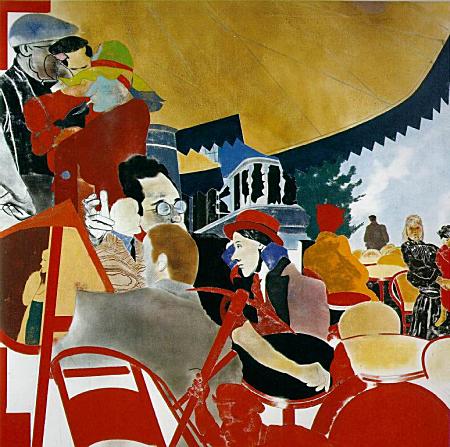
The Autumn of Central Paris
The street conducts the flâneur into a vansihed time. For him, every street is precipitous. It leads downward - if not to the mythical Mothers, then into a past that can be all the more spellbinding because it is not his own, not private. Nevertheless, it always remains the time of a childhood. But why that of the life he has lived? In the asphalt over which he passes, his steps awaken a surprising resonance. The gaslight that streams down on the paving stones throws an equivical light on this double ground.

Käthe Kollwitz
PoemTalkMy Problem Ron Silliman, Rachel Blau DuPlessis and Charles Bernstein on Rae Armantrout's "The Way."Rae Armantrout at Penn Sound and the Electronic Poetry Center
Singing Through The Echo
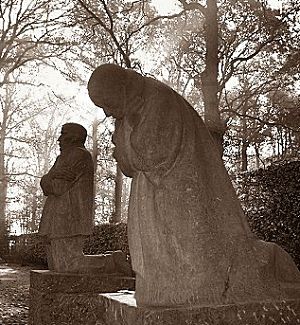
The Mourning Parents
Philosophy as Biography ... contrary to the usual assertion according to which “the end of metaphysics” you know, is being accomplished, and all that, philosophy precisely can not have an end, because it is haunted, from within itself, by the necessity to take one more step within a problem that already exists. And I believe that this is its nature. The nature of philosophy is that something is eternally being bequeathed to it. It has the responsibility of this bequeathal. Your are always treating the bequeathal itself, always taking one more step in the determination of what was thus bequeathed to you. As myself, in the most unconscious manner, I never did anything as a philosopher except respond to an appeal that I had not even heard.(....)
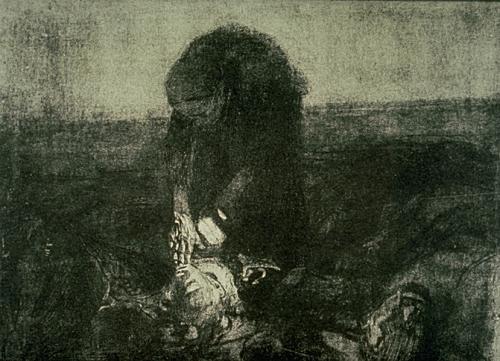
After the battle
... most of our energy conversations, at conferences, schools, institutions, and the blogosphere, focus on the means, and not the ends. The ends have generally remained unquestioned. There seems to be an implicit assumption that worldwide energy demand will continue to grow something akin to a natural law, and that solutions should focus on ways to increase supply and/or efficiency of energy. But in an economic system based on self-interest on a finite planet, the true drivers of demand will need to be better understood beyond the microeconomic mantra "price will change behavior".
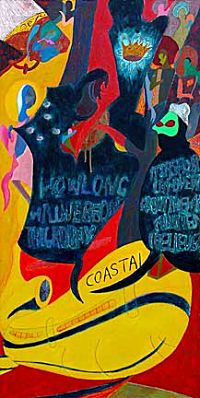
Glossolalia
The Theory and Practice of Oligarchic Collectivism
The big Lie. Nothing is so conntagiouly inspiring as total commitment to a blatant fraud. It is as awesome as levitation. We Americans are so childishly delighted with the bare act of choosing, like Midas in the first hour of his "golden touch", it hardly matters what; but vry often i am as weary with the plethora of indistinguishables, as Midas after years of the curse, till i cry out: only give me one necessary task & the barest sustenance, & i will ask no more! But my art refuses me.Emmanuel Goldstein's The Theory and Practice Of Oligarchical Collectivism (George Orwell, Nineteen Eighty-Four) comes to life. Michael maintains graywyvern and is also a contributor at TaKinG thE BriM_ TooK thE BrOoM
from

...creek and forest become One
Tanka 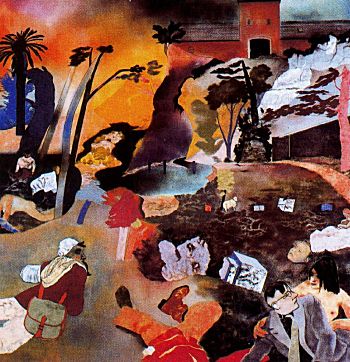
If not, not
Perhaps most interesting about Hardt and Negri and their fifteen minutes of fashion is how their anarchist flavoured echo of the longer-lived and firmly centrist, bourgeois fashion of Stakeholder Theory, enjoying undiminished vocab hegemony at the EC today, offers an illustration of the protean qualities and adaptability of ideology and the efficacy of image-regime innovations in discourse. More revealing than any specific suggestion, image or assertion found in Empire and Multitide are the astonishingly agile mechanisms and the speed of image and vocabulary replication, and the relations between the little circuit of conversation it created, establishing a fairly rigid paradigm though flying the banner of openness, and the parallel circuits of the mother discourse of neoliberal globalisation and stakeholder supremacism. The pairing makes an especially instructive contrast to similar pairings of dominant and dissident discourse which predate television, and those which predate cinema. One could perhaps number among the items of the newness announced a logic of parasitic-ironic transformation, accompanied by a covert cooperative dramaturgy of framework management, in the relations between dominant and leading dissident political discourses in the postwar (post tv, post modern, post Fordist, whatever) era, replacing earlier, perhaps cruder logics of rhetorical contest common in periods, and still today in places, where management of the spectacle is less concentrated and its functioning more fragmented and contested.The first of an 8 part series at Le Colonel Chabert
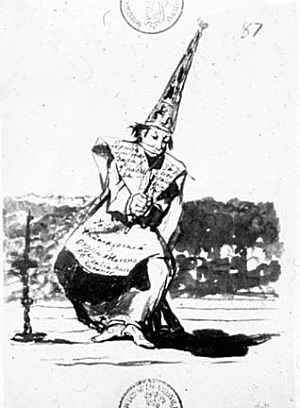
Illegible Bodies: On Not Seeing Goya's Disasters Of War Goya in Times of War I don’t know, & don’t have a lot of ammunition to waste, but it seems like we go from day-to-day, week-to-week, in some inattentive mentality, where once was Caesar, then Napoleon, ultimately Bush. It’s as goofy & unlearned of the past as the latter’s smirk.
Make Way for Field Marshall ObamaPresidential candidate Barak Obama, "The Peace Candidate", supports a stronger commitment to the war in Afghanistan and has proposed "sending at least two additional combat brigades -- or 7,000 to 10,000 troops -- to Afghanistan, while deploying more Special Operations forces to the Afghan-Pakistan border. Hunkering Down in Afghanistan Mike Whitney It was all hogwash. None of the promises have been kept and none of the goals have been achieved. Besides, war isn't an instrument for positive social change; it's about killing people and blowing up things. Dolling-up military aggression as "preemption" can work for a while, but eventually the truth comes out. Democracy and modernity don't come from the barrel of a gun.
It is the city that is formulated as the foundation of social and political life, insofar as its founding established the critical difference between physiological life (bare life) and community (polis). The difference seems to be the issue, as well, as Agamben finds in the course of his tour through the ontological foundations of social orders, social mores, and political structures a profound shift from one form of life to another, always predicated on hidden and sometimes sinister ritual rites that signal sovereign power arrives through the state of exception which is also apostasized in 'bare life' (homo sacer), a figure that he describes as life "that may be killed and yet not sacrificed" (passim). Bare life is secret analog for Power.
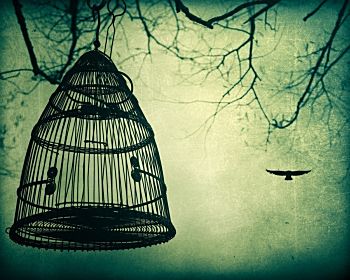 This Bird Has Flown...
The ground of the imageThe truth of violence both destroys and destroys itself. It shows itself to be what it is: nothing other than the truth of the fist and the weapon. It is the thick twat’s kind of truth. It is the kind that snickers, spits, and yells, that enjoys its display of violence (enjoyment, for violence, is without pleasure and without joy; it feeds on the very image of its violence). The violence of truth is something completely different from this. It is a violence that withdraws even as it irrupts and—because this irruption itself is a withdrawal—that opens and frees a space for the manifest presentation of the true. (Once again, let us put something on hold: are there not, corresponding to each side, two kinds of image?) Jean-Luc Nancy Translated by Jeff Fort download pdf Two assertions about images have become very familiar to us. The first is that images are violent: we often speak of being ‘‘bombarded by advertising,’’ and advertising evokes, in the first place, a stream of images. The second is that images of violence, of the ceaseless violence breaking out all over the world, are omnipresent and, simultaneously or by turns, indecent, shocking, necessary, heartrending. These assertions lead very quickly to the elaboration of ethical, legal, and aesthetic demands (and there is also now the specific register belonging to the arts of violence and violence in art), for the purpose of introducing regulations that would control violence or images, the image of violence or the violence of images. My intention here is not to enter into the debate concerning such demands. Instead, I want to get behind the assertions themselves in order to interrogate what can link, in a particular way, the image to violence and violence to the image. If we can expect from our inquiry some clarification at least in our thinking on this matter, it will no doubt relate to the ambivalence that pervades, in a parallel and therefore remarkable way, our general sense of both terms. There is something good and something bad in both violence and the image. There is something necessary and something unnecessary. It is as if there were constitutively two possible essences of the image and of violence, and consequently also two essences of the violence of the image and of the image of violence. It would be easy to list instances and configurations of these double dualities or redoubled duplicities in the history of the modern world.
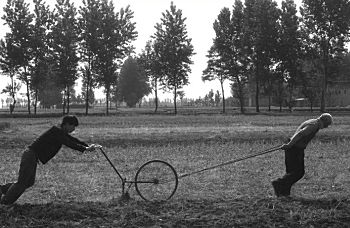
The Charm Of The Countryside Blurring the Boundaries: History, Memory and Imagination in the Works of W G Sebald [PDF]
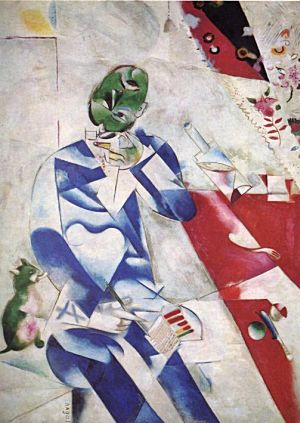
The Poet, or Half Past Three
Mother’s Day—our last, ma petite mere, sugared battle-ax, thorny womb, my life’s obsession. Forgoing easier tributes, bath confections, a silk nightie, I challenge Mater Magnificat, nearly ninety—nonagenarian!—to the old backyard nine-wicket two-stake Double Diamond game, croquet, from the French, croquet, meaning crooked stick. Invite yonder MeeMaw, right-winged Francophile, to the garden sport invented by fourteenth-century French peasants using stout brooms and hoops of bent willow, later gentrified by courts of crushed cockleshell, wild flowers twined round wire hoops and torches of tallow set ablaze for erotic night play. Sport of sequence and no consequence, barbed with rules, pickled in etiquette, its wire wickets once described by a Victorian preacher from Boston as the gaping Jaws of Hades, yet a game put forth by Captain Mayne Reid, hero of the Mexican War and author of sentimental books for boys, as a wholesome substitute for war. 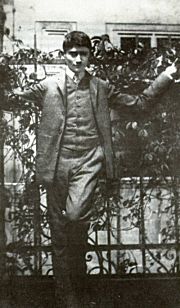
Franz Kafka
Das Schloss We are as forlorn as children lost in the woods. When you stand in front of me and look at me, what do you know of the griefs that are in me and what do I know of yours? And if I were to cast myself down before you and weep and tell you, what more would you know about me than you know about hell when someone tells you it is hot and dreadful? For that reason alone we human beings ought to stand before one another as reverently, as reflectively, as lovingly, as we would before the entrance to hell. 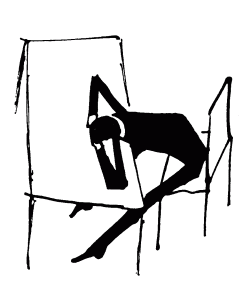
-Everything I read since then has been a reading of Pessoa. Everything that search for a kind of hammock in the day - not for reading, but for living of a type that was not allowed anymore. Pessoa lived on a street near the cafe. He belonged there; even Bernardo Soares had his two feet on the ground in Lisbon; he was no ghost: that's what I tell myself this morning, however foolishly. Or he was a ghost who still belonged to a place, haunting it to show that another life was possible, that you might live in another way. But here, now? No ghosts, no possibilities; no high place to reach by way of reading.
The Poet and the WorldTortures Wislawa Szymborska b. July 2, 1923 Nothing has changed. The body is susceptible to pain, it must eat and breathe air and sleep, it has thin skin and blood right underneath, an adequate stock of teeth and nails, its bones are breakable, its joints are stretchable. In tortures all this is taken into account. Nothing has changed. The body shudders as it shuddered before the founding of Rome and after, in the twentieth century before and after Christ. Tortures are as they were, it's just the earth that's grown smaller, and whatever happens seems right on the other side of the wall. Nothing has changed. It's just that there are more people, besides the old offenses new ones have appeared, real, imaginary, temporary, and none, but the howl with which the body responds to them, was, is and ever will be a howl of innocence according to the time-honored scale and tonality. Nothing has changed. Maybe just the manners, ceremonies, dances. Yet the movement of the hands in protecting the head is the same. The body writhes, jerks and tries to pull away, its legs give out, it falls, the knees fly up, it turns blue, swells, salivates and bleeds. Nothing has changed. Except for the course of boundaries, the line of forests, coasts, deserts and glaciers. Amid these landscapes traipses the soul, disappears, comes back, draws nearer, moves away, alien to itself, elusive, at times certain, at others uncertain of its own existence, while the body is and is and is and has no place of its own. Wislawa Szymborska Nobel Lecture, December 7, 1996
The existence of a training led by a US defense contractor to teach Mexican police torture tactics in order to combat organized crime and the local government's adamant defense of the program is particularly disturbing considering the US government's recent approval of the $1.6 billion Plan Mexico, also known as the Merida Initiative. Plan Mexico is an aid package specifically designed to support President Felipe Calderón's deadly battle against organized crime. It will fund more US training for Mexican police and military, in addition to providing them with riot gear, spy equipment, and military aircraft. Plan Mexico allows funds for the deployment of up to fifty US defense contractors to Mexico.
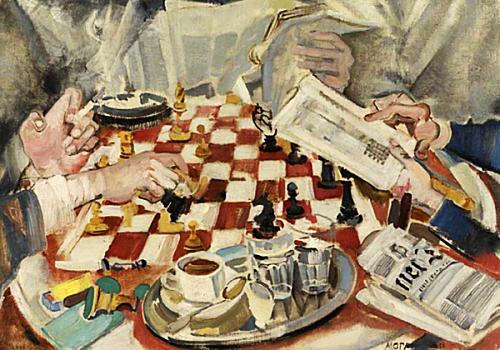
Die Schachpartie
The "World" ofthe Enlightenment to Come
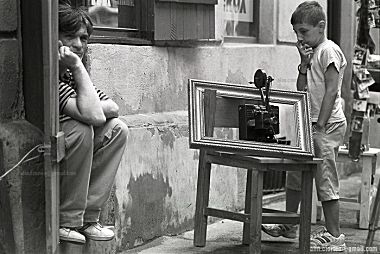
dreams delivery
Citizens, both producers and consumers, or prosumers, have become objects of control – individuals who are examined not only according to Foucault's definition, but also by the entire economic structure. If there is no control, the prosumerist society will simply disintegrate. It would be naïve to assume that prosumers can choose identity. It is ascribed to them by default. Today, one is even born with it. Such is the order of the capitalist system, when individuals are free to choose professions but not the status of the producer and the consumer. (....)
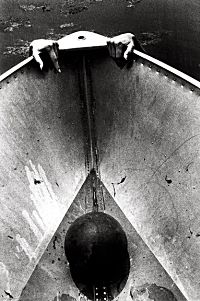
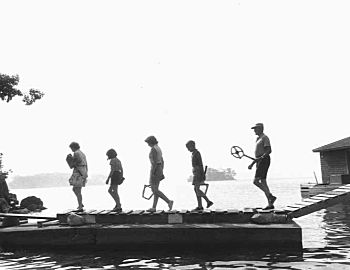
Endless Summer
Alice Notley at the Electronic Poetry CenterWhere Is The Babylonian Meter With Its Lovely Caesura? from Disobedience Alice Notley A smell of sun-baked earth water origanum and also a clove-scented flower That tree with crimson blossoms gold-centered almost opened up what memory center in me? But it won't come. It was some sort of happiness. The happiness oozed up materially. -------------------------- Where is the story the path through I want a unity for it--because I, I am unified exactly the human world is unified in a different way... accidently, by technology and aggression.
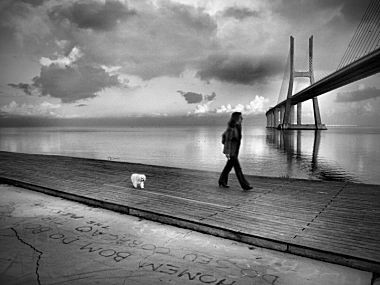
Just a walk...
Absinthe: New European WritingCome, Come to Me Now That I'm Old, Not Love excerpts
Can we speak of memory as falling prey to the seizure of a death throe, caught thereafter in a state of artificial animation? Where am “I” in this process, that is to say: the real me? Of course, in the least we know the following: the power of place is not strong enough to wholly contain time without the side effects of contamination, rupture, and disease. Even in the sunlight, the broken rays of the past collide with the clarity of a given place: a city, town, hill, street, house, room, cupboard, or even the alcove of a drawer. Place breaks, and the discharge of time enters the scene.
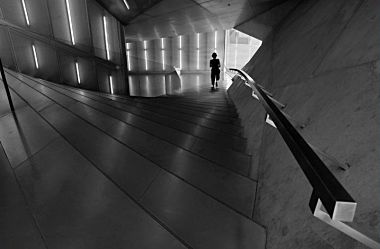
Converging
There are nights when dreams run stories one into another, preventing the sleeper from making a clean break between scenes that strange actors link together in his head, and so it seems that the night has been no more than the prolongation of a day that gradually has made the light disappear to make room for this palpable life shadow of that which is real. Nightmares to make your legs shudder and to talk about when awake, bare hints of laughter on the threshold of wakefulness, feeling the dreamed pains so distinctly that you could describe them with precision. This is why Mother listens behind the door and when she sees that she is screaming or crying in her sleep, she wakes her. Of all this, Joana knows nothing, nor of the mattress that we place in front of her door, where we take it in turns to sleep, now my mother now me, listening attentively, making her sleep ours, leaving our selves beside her.
Say you want a revolution In the spirit of Independence Day and Bastille Day, we salute freedom fighters of all stripes with writing about revolution. In the pulsing heat of Che’s Havana and the gray chill of Lenin’s Moscow, on ravaged battlefields and blasted domestic fronts, writers storm citadels and oust tyrants in campaigns for personal and political liberty. Maïssa Bey, Liliana Blum, Izzet Celasin, Fritz Glockner, Michael Kleeberg, Belkis Cuza Malé, Leonardo Padura, Richard Marazano & Xavier Delaporte, and Francesc Serés file dispatches on upheaval at home and abroad. 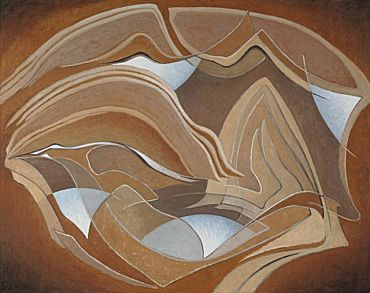
Nature Rhythms
Encounters and valedictions, summons and replies: the communication of meaning implies an act of the heart, an openness that may lead to embarrassment and pain, muddle and contention; but that communication also trusts that something will come, something essential will be passed on between people, between the cosmos and ourselves.(...)
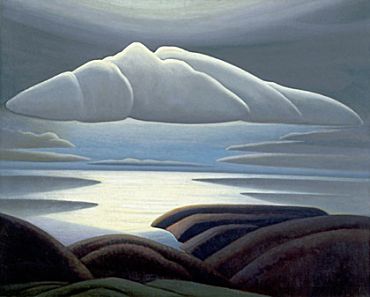
"Clouds, Lake Superior" The Group of Seven: Painters in the Wilderness
The World And I This is not exactly what I mean Any more than the sun is the sun. But how to mean more closely If the sun shines but approximately? What a world of awkwardness! What hostile implements of sense! Perhaps this is as close a meaning As perhaps becomes such knowing. Else I think the world and I Must live together as strangers and die— A sour love, each doubtful whether Was ever a thing to love the other. No, better for both to be nearly sure Each of each—exactly where Exactly I and exactly the world Fail to meet by a moment, and a word. - Laura Riding
The history of Guernica also calls Benjamin's binary typology of aesthetic experience into question. One can contemplate Guernica and recognize that one's encounter with a work of art might mean, contrary to the thinking of Bentham, Robbins, and Benjamin, that aesthetic experience might involve more than the satisfaction of preferences; as we gaze at the picture, we become aware that Guernica might be awakening desires and fears hitherto dormant within us, cultivating new ways of seeing, and, in the most general terms, allowing us to lose ourselves within a particular visual experience so that we might find ourselves anew. ... We might understand our contemplation of Guernica as an element in a continuing collective effort, and this understanding should remind us that we should not allow ourselves to be browbeaten by either the ultraleftist disciples of Benjamin or the neoliberal followers of Robbins into believing that the individual is simply the contrary of the collective.Contemporary Aesthetics Volume 6 (2008)
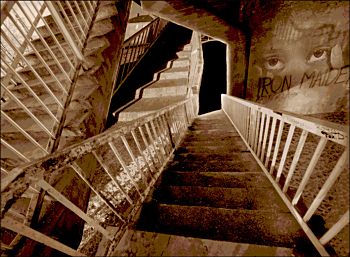
Masks
| |
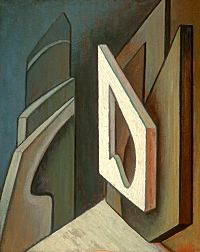
 A Klee painting named ‘Angelus Novus’ shows an angel looking as though he is about to move away from something he is fixedly contemplating. His eyes are staring, his mouth is open, his wings are spread. This is how one pictures the angel of history. His face is turned toward the past. Where we perceive a chain of events, he sees one single catastrophe which keeps piling wreckage and hurls it in front of his feet. The angel would like to stay, awaken the dead, and make whole what has been smashed. But a storm is blowing in from Paradise; it has got caught in his wings with such a violence that the angel can no longer close them. The storm irresistibly propels him into the future to which his back is turned, while the pile of debris before him grows skyward. This storm is what we call progress.
A Klee painting named ‘Angelus Novus’ shows an angel looking as though he is about to move away from something he is fixedly contemplating. His eyes are staring, his mouth is open, his wings are spread. This is how one pictures the angel of history. His face is turned toward the past. Where we perceive a chain of events, he sees one single catastrophe which keeps piling wreckage and hurls it in front of his feet. The angel would like to stay, awaken the dead, and make whole what has been smashed. But a storm is blowing in from Paradise; it has got caught in his wings with such a violence that the angel can no longer close them. The storm irresistibly propels him into the future to which his back is turned, while the pile of debris before him grows skyward. This storm is what we call progress.